|
Thanks to Muslim Collective for the Climate Conscious Iftar at Pitt Street Uniting Church last night, with a particular emphasis on Palestine, and the intersections of ecological and human destruction with militarism and colonialism. Moving stories, a powerful exhibition, wonderful company and glorious music and dance . My own words shared are below...
0 Comments
 Among the several fine contributions to last Saturday’s ‘Voice and the Church’ gathering was that by the Revd Dr Rangi Nicholson, Assistant Priest of Rangiatea Church, the oldest Māori Anglican Church in Aotearoa, and author of ‘Treaty, Church and Nation’, reminding us that though our own struggles are specific they are also common and enriched by solidarity with others across the globe. He spoke powerfully of what needs doing from Māori and Anglican experience in Aotearoa New Zealand - including how, without meaningful resources empowerment is limited, and how the Church needs to be held accountable for benefitting from oppression. There is so much, he rightly identified, that the Church needs to do in terms of recognition, repentance, restitution and reparation. His three future hopes are pertinent to struggles in Australia too, and beyond: 1. More commitment by the Church to truth telling and ‘the whole story’ - with repentance and reparations 2. the Church needs to put its own house in order re authentic partnership whilst offering constructive critique of Government’s commitment to the UN rights of Indigenous People, reimagining a more just Church and nation. 3. the need for the Church to contribute boldly and with love to a new constitution - to visioning and values clarification for the future of the country - as part of restorative justice As he says: Whilst Treaty, in the experience of Aotearoa, can be a ‘sacred covenant’ allowing new life and renewed attention, there needs to be much more - for: ‘Restorative justice needs to become a priority’ - led with young people...  Today is an opportunity for everyone to rejoice in the great historic achievement of the Mabo campaign in reclaiming title to land and self-determination, toppling the monstrous British and white Australian fiction of ‘terra nullius’ - and to be inspired to address continuing injustices, not least those of enduring violence and dispossession borne of colonialism. This should truly be one of Australia’s great public holi(holy)days, not just another day, and its messages should be developed every day...  'When someone starts talking about principles, watch your back!' This was one of many 'bon mots' I learned from Geoff Garner, my delightful supervising vicar when I was a curate in the East End of London. Partly what he was saying was that when human beings become agitated, for or against a controversial proposal, humanity and genuine love go out the window. So called 'principles' and 'values' become used as weapons: at best providing insulation from genuine engagement, or, often, simply being used to harm others. Geoff himself knew well to his cost how this worked. As a founding member of LGCM (originally the Gay Christian Movement), as an inter-faith adviser to the Bishop of London, and in the open and humane way he ministered with others, he was frequently a target of others' internal difficulties and defensiveness. For Geoff, and for me, this is far from how Jesus lived, taught and acted. Last weekend I spoke at the Toowoomba Marriage Equality event, sharing my own, positive, perspectives on what is too often an area of Christian 'principled' resistance and denial (click here for my address on that occasion). At the meeting, I was once more struck by the qualities of love, joy, and kindness so many LGBTI+ people have for one another and others. Since then, I have once more been overwhelmed by the generosity and warmth of fellow marriage equality supporters with whom I have corresponded. This, I believe, reflects the immense wellspring of love within the LGBTI+ community which still longs for full release. It is a powerful contrast with the spirit of some Christian circles which persist in turning their backs on this wonderful source of renewal for us all. Most certainly, there is also Christian discomfort about marriage equality which is neither bigoted nor defensively armed with principles. One of my close Anglican colleagues for example is wary of marriage equality legislation because they feel some advocates are themselves equipped with principles (such as exaggerated 'rights' discourses) which they can wield like aggressive weapons. Perhaps, but I saw none of this last weekend in the keynote addresses of Marriage Equality leaders such as Shelley Argent and Rodney Croome. Instead they spoke with humour and humility about those things which touch all our lives: love and family, pain and joy, being valued, recognition and relationships. These are not abstract principles but the realities of life which bind us together. One Christian leader who has upbraided me since last weekend accuses me, among other things, of being infected by humanism. It is one accusation - unlike many others - which, with qualifications, I am happy to own. For a healthy Christian humanism is surely an antidote to picking up the weapons of principle. Like my mentor Geoff Garner, I see in Jesus the embodiment of the humane as well as the the holy, someone who stood not on principle but in the power of love: in that sense being both fully human as well as fully revealing of the mystery of divine love which transcends all our human differences (male and female, Jew and Gentile, and all the rest - including queer and straight). Julia Baird, in a recent article, reflects, in a typically incisive and balanced manner, on the challenges of discerning what is 'free' speech and what is 'hate' speech in the marriage equality debate. My sense is that part of the answer is in returning with prayerful discernment to the Christian injunction about 'speaking the truth in love' (Ephesians 4.15). Too often this can mean Christian justification for simply being mean, aggressive, demeaning, or worse. When I hear or read the words 'I just want to say this to you in Christian love', I am also instinctively tempted to duck for cover, just like Geoff Garner. It is hardly that I do not care about truth and truth-speaking. Part of my problem is that parts of the Church do not really want to explore truth and sometimes actively seek to silence the truths of others. No, the heart of the matter is what we mean by love. Is it truly an openness to genuine truth-seeking and the fresh insights of the Holy Spirit, or is it only a cover for ego and group fear and defensiveness? Whatever our views on marriage equality - and, sadly, the debate is likely to go on in the Church as a whole for ages after it is settled in Australia in law - when we come to 'speaking the truth in love', perhaps we need to spend more time on that last word love. It is too easy to leap to principle without love. For those of us who share in pastoral care, the ability to share a prophetic word is also important. Yet we need to be kind and compassionate in how, as well as what we say. For me, much maligned 'political correctness' often seems really to amount to no more than being polite and respectful to others - precisely the opposite of the Pharisaism, wielding principles like weapons, which Jesus so abhorred and transcended. We are not all agreed, not will we be, with or without a plebiscite. Most Christians however, for and against, genuinely seek to honour God and our conscience. So let us seek the truth indeed, but let us be gentle with it.  my short address from the inter-religious panel of which I was a part at the UNESCO forum last week... Amitofu - salaam alaikum - shalom - g'day... I would like to share a special prayer - one which has been of great value to churches across the world, who together, through bodies such as the World Council of Churches, have sought intentionally, throughout this 21st century, to address violence and its causes. There are 4 elements to this prayer. These, I believe, help to sum up and focus Christian understandings of peacemaking: 4 elements to which, of course, we need to add another, namely, repentance (understood as saying sorry for our own parts in the violence of the world - and what others have done in our name: the name of our religion, or our country, or our ethnic or other group.) This is presupposed, for without repentance - without a profound change of heart - we cannot be free. The 4 elements of my prayer today help us seek this repentance or change of heart, as they are elements which are similarly deeply grounded in the Christian tradition but which are also accessible to all, to people of other faiths and none - and what we have heard earlier from Madagascar, for example has reflected that. The four key elements of this change of heart are: Firstly, Truth - because without truth we can never deal with things properly. Now of course Truth can be uncomfortable to face up to - like the truth about the violence inflicted in Australia in the past on our Indigenous peoples, or the truth of facing up to the violence of what has caused war and violence elsewhere, and continues to do so. Yet without truth there can be no reconciliation and no real healing - we are always likely to be violent again. As Jesus said - 'the truth will set you free'. Secondly, Justice - for without Justice there can be no real peace - as the biblical tradition has it, peace and justice belong intimately together: as the Psalmist puts it (Psalm 85.10) justice and peace must kiss one another for live to triumph. Or, as Pope Francis has reminded us, "without a solution to the problems of (today's refugees and) the (global) poor, we cannot resolve the problems of the world.' Thirdly, Compassion - for Compassion is, for Christians, the heart of God, and embodied in Jesus Christ. Until we have a heart for one another - until we start to share one heart, as some Indigenous peoples say, then we will always be broken people and a broken world. Until then there is a part of our own heart missing. We have to seek grace to cultivate kindness and mercy and their power to transform us and our world. Fourthly, Courage - for ourage is required to take risks for peace, justice and compassion. This is the courage of Jesus even to risk death in the hope of a better world and in the assurance that nothing can ever destroy the ultimate reality of life - the love of God - which can transform all that evil throws against it. For making peace comes at a cost but it is the path to renewal, or, as Christians put it, redemption. All of these things - truth, justice, compassion and courage - are crucial as part of our education for peace and a repentant, or transformed, heart and world. So let me therefore share this prayer of blessing: May God bless us with discomfort at easy answers, half-truths, superficial relationships, so that we will live deep within our hearts. May God bless us with anger at injustice, oppression and exploitation of people, so that we will work for justice, equity and peace. May God bless us with tears to shed for those who suffer from pain, rejection, starvation and war, so that we will reach out our hands to comfort them and change their pain to joy. And may God bless us with the foolishness to think that we can make a difference in the world, so that we will do the things which others tell us cannot be done. In Jesus Name, Amen. |
AuthorJo Inkpin is an Anglican priest serving as Minister of Pitt St Uniting Church in Sydney, a trans woman, theologian & justice activist. These are some of my reflections on life, spirit, and the search for peace, justice & sustainable creation. Archives
July 2024
Categories
All
|
 RSS Feed
RSS Feed